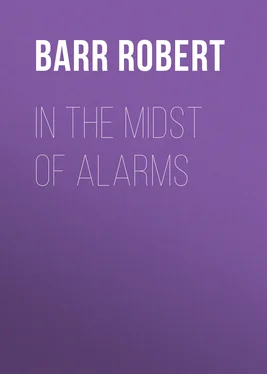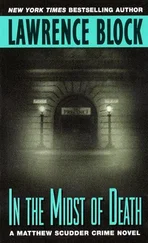Robert Barr - In the Midst of Alarms
Здесь есть возможность читать онлайн «Robert Barr - In the Midst of Alarms» — ознакомительный отрывок электронной книги совершенно бесплатно, а после прочтения отрывка купить полную версию. В некоторых случаях можно слушать аудио, скачать через торрент в формате fb2 и присутствует краткое содержание. Жанр: foreign_prose, foreign_antique, на английском языке. Описание произведения, (предисловие) а так же отзывы посетителей доступны на портале библиотеки ЛибКат.
- Название:In the Midst of Alarms
- Автор:
- Жанр:
- Год:неизвестен
- ISBN:нет данных
- Рейтинг книги:4 / 5. Голосов: 1
-
Избранное:Добавить в избранное
- Отзывы:
-
Ваша оценка:
- 80
- 1
- 2
- 3
- 4
- 5
In the Midst of Alarms: краткое содержание, описание и аннотация
Предлагаем к чтению аннотацию, описание, краткое содержание или предисловие (зависит от того, что написал сам автор книги «In the Midst of Alarms»). Если вы не нашли необходимую информацию о книге — напишите в комментариях, мы постараемся отыскать её.
In the Midst of Alarms — читать онлайн ознакомительный отрывок
Ниже представлен текст книги, разбитый по страницам. Система сохранения места последней прочитанной страницы, позволяет с удобством читать онлайн бесплатно книгу «In the Midst of Alarms», без необходимости каждый раз заново искать на чём Вы остановились. Поставьте закладку, и сможете в любой момент перейти на страницу, на которой закончили чтение.
Интервал:
Закладка:
“It was a little before your day.”
“So was 1812; but my father fit in it, an’ I never heard him tell of this Revolution. He’d ‘a’ known, I sh’d think. There’s a nigger in the fence somewheres.”
“Well, England was rather busy at the time with the French.”
“Ah, that was it, was it? I’ll bet England never knew the Revolution was a-goin’ on till it was over. Old Napoleon couldn’t thrash ‘em, and it don’t stand to reason that the Yanks could. I thought there was some skullduggery. Why, it took the Yanks four years to lick themselves. I got a book at home all about Napoleon. He was a tough cuss.”
The professor did not feel called upon to defend the character of Napoleon, and so silence once more descended upon them. Bartlett seemed a good deal disturbed by the news he had just heard of the Revolution, and he growled to himself, while the horses suffered more than usual from the whip and the hauling back that invariably followed the stroke. Yates was some distance ahead, and swinging along at a great rate, when the horses, apparently of their own accord, turned in at an open gateway and proceeded, in their usual leisurely fashion, toward a large barn, past a comfortable frame house with a wide veranda in front.
“This is my place,” said Bartlett shortly.
“I wish you had told me a few minutes ago,” replied the professor, springing off, “so that I might have called to my friend.”
“I’m not frettin’ about him,” said Bartlett, throwing the reins to a young man who came out of the house.
Renmark ran to the road and shouted loudly to the distant Yates. Yates apparently did not hear him, but something about the next house attracted the pedestrian’s attention, and after standing for a moment and gazing toward the west he looked around and saw the professor beckoning to him. When the two men met, Yates said:
“So we have arrived, have we? I say, Stilly, she lives in the next house. I saw the buggy in the yard.”
“She? Who?”
“Why, that good-looking girl we passed on the road. I’m going to buy our supplies at that house, Stilly, if you have no objections. By the way, how is my old friend 1812?”
“He doesn’t seem to harbor any harsh feelings. In fact, he was more troubled about the Revolution than about the blow you gave him.”
“News to him, eh? Well, I’m glad I knocked something into his head.”
“You certainly did it most unscientifically.”
“How do you mean—unscientifically?”
“In the delivery of the blow. I never saw a more awkwardly delivered undercut.”
Yates looked at his friend in astonishment. How should this calm, learned man know anything about undercuts or science in blows?
“Well, you must admit I got there just the same.”
“Yes, by brute force. A sledge hammer would have done as well. But you had such an opportunity to do it neatly and deftly, without any display of surplus energy, that I regretted to see such an opening thrown away.”
“Heavens and earth, Stilly, this is the professor in a new light! What do you teach in Toronto University, anyhow? The noble art of self-defense?”
“Not exactly; but if you intend to go through Canada in this belligerent manner, I think it would be worth your while to take a few hints from me.”
“With striking examples, I suppose. By Jove! I will, Stilly.”
As the two came to the house they found Bartlett sitting in a wooden rocking chair on the veranda, looking grimly down the road.
“What an old tyrant that man must be in his home!” said Yates. There was no time for the professor to reply before they came within earshot.
“The old woman’s setting out supper,” said the farmer gruffly, that piece of information being apparently as near as he could get toward inviting them to share his hospitality. Yates didn’t know whether it was meant for an invitation or not, but he answered shortly:
“Thanks, we won’t stay.”
“Speak fur yourself, please,” snarled Bartlett.
“Of course I go with my friend,” said Renmark; “but we are obliged for the invitation.”
“Please yourselves.”
“What’s that?” cried a cheery voice from the inside of the house, as a stout, rosy, and very good-natured-looking woman appeared at the front door. “Won’t stay? Who won’t stay? I’d like to see anybody leave my house hungry when there’s a meal on the table! And, young men, if you can get a better meal anywhere on the Ridge than what I’ll give you, why, you’re welcome to go there next time, but this meal you’ll have here, inside of ten minutes. Hiram, that’s your fault. You always invite a person to dinner as if you wanted to wrastle with him!”
Hiram gave a guilty start, and looked with something of mute appeal at the two men, but said nothing.
“Never mind him,” continued Mrs. Bartlett. “You’re at my house; and, whatever my neighbors may say ag’in me, I never heard anybody complain of the lack of good victuals while I was able to do the cooking. Come right in and wash yourselves, for the road between here and the fort is dusty enough, even if Hiram never was taken up for fast driving. Besides, a wash is refreshing after a hot day.”
There was no denying the cordiality of this invitation, and Yates, whose natural gallantry was at once aroused, responded with the readiness of a courtier. Mrs. Bartlett led the way into the house; but as Yates passed the farmer the latter cleared his throat with an effort, and, throwing his thumb over his shoulder in the direction his wife had taken, said in a husky whisper:
“No call to—to mention the Revolution, you know.”
“Certainly not,” answered Yates, with a wink that took in the situation. “Shall we sample the jug before or after supper?”
“After, if it’s all the same to you;” adding, “out in the barn.”
Yates nodded, and followed his friend into the house.
The young men were shown into a bedroom of more than ordinary size, on the upper floor. Everything about the house was of the most dainty and scrupulous cleanliness, and an air of cheerful comfort pervaded the place. Mrs. Bartlett was evidently a housekeeper to be proud of. Two large pitchers of cool, soft water awaited them, and the wash, as had been predicted, was most refreshing.
“I say,” cried Yates, “it’s rather cheeky to accept a man’s hospitality after knocking him down.”
“It would be for most people, but I think you underestimate your cheek, as you call it.”
“Bravo, Stilly! You’re blossoming out. That’s repartee, that is. With the accent on the rap, too. Never you mind; I think old 1812 and I will get on all right after this. It doesn’t seem to bother him any, so I don’t see why it should worry me. Nice motherly old lady, isn’t she?”
“Who? 1812?”
“No; Mrs. 1812. I’m sorry I complimented you on your repartee. You’ll get conceited. Remember that what in the newspaper man is clever, in a grave professor is rank flippancy. Let’s go down.”
The table was covered with a cloth as white and spotless as good linen can well be. The bread was genuine homemade, a term so often misused in the cities. It was brown as to crust, and flaky and light as to interior. The butter, cool from the rock cellar, was of a refreshing yellow hue. The sight of the well-loaded table was most welcome to the eyes of hungry travelers. There was, as Yates afterward remarked, “abundance, and plenty of it.”
“Come, father!” cried Mrs. Bartlett, as the young men appeared; they heard the rocking chair creak on the veranda in prompt answer to the summons.
“This is my son, gentlemen,” said Mrs. Bartlett, indicating the young man who stood in a noncommittal attitude near a corner of the room. The professor recognized him as the person who had taken charge of the horses when his father came home. There was evidently something of his father’s demeanor about the young man, who awkwardly and silently responded to the recognition of the strangers.
Читать дальшеИнтервал:
Закладка:
Похожие книги на «In the Midst of Alarms»
Представляем Вашему вниманию похожие книги на «In the Midst of Alarms» списком для выбора. Мы отобрали схожую по названию и смыслу литературу в надежде предоставить читателям больше вариантов отыскать новые, интересные, ещё непрочитанные произведения.
Обсуждение, отзывы о книге «In the Midst of Alarms» и просто собственные мнения читателей. Оставьте ваши комментарии, напишите, что Вы думаете о произведении, его смысле или главных героях. Укажите что конкретно понравилось, а что нет, и почему Вы так считаете.












